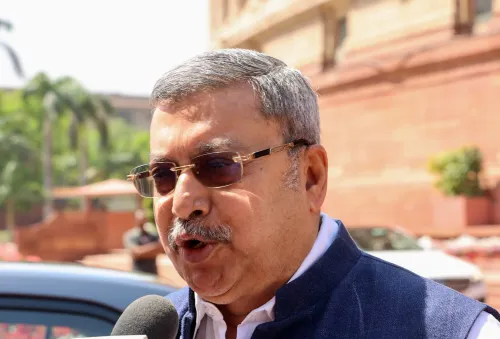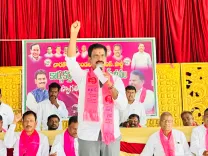Why Did Odisha Speaker Reject Congress No-Confidence Motion?

Synopsis
Key Takeaways
- The Speaker dismissed the no-confidence motion due to procedural disruptions.
- Congress MLAs protested and claimed unfair treatment.
- BJD leaders accused the Congress of attempting to tarnish their reputation.
- The assembly continued its legislative business amidst the controversy.
- Political tensions in Odisha are currently high.
Bhubaneswar, Sep 22 (NationPress) - The Speaker of the Odisha Assembly, Surama Padhy, on Monday dismissed the no-confidence motion proposed by the opposition Congress party against the state government.
When the House convened at 4 p.m. that day, Congress CLP leader Rama Chandra Kadam urged Padhy to accept the no-confidence motion submitted by the party.
In response, the Speaker informed the assembly that on September 18, the Congress Legislature Party leader, along with 14 other MLAs, had filed a no-confidence notice with the assembly secretary.
Padhy had subsequently instructed that the notice be presented in the House the next day, September 19.
However, the motion could not be discussed as the assembly was out of order. She further explained that due to ongoing disruptions, the time allocated for the no-confidence motion had expired.
In reaction, Congress legislators rushed to the well of the house, chanting slogans near Speaker Padhy’s podium.
They ultimately walked out of the House in protest against the rejection of their motion.
Following this, the Congress MLAs staged a demonstration under the statue of Mahatma Gandhi on the assembly grounds.
Speaking with reporters, Kadam stated, “We followed all parliamentary protocols in submitting the motion. Yet, the Speaker unjustly and intentionally dismissed it.”
He accused the BJP-led state government of orchestrating the motion's rejection through the Speaker.
Kadam further alleged that both the ruling BJP and BJD conspired to disrupt the House and silence the Congress party’s voice.
In contrast, BJD Chief Whip Pramila Mallik previously criticized the Congress for attempting to move the no-confidence motion with only 14 MLAs present.
She claimed that the Congress acted without consulting the main opposition, BJD, to tarnish her party's image.
According to her, the Congress lacks a solid voter base and resorts to such tactics to regain public attention.
Meanwhile, the House proceeded with its agenda as members of BJD and BJP remained present.
Higher Education Minister Suryabanshi Suraj introduced the Odisha University (Amendment) Bill, 2025, which was then taken up for discussion.









